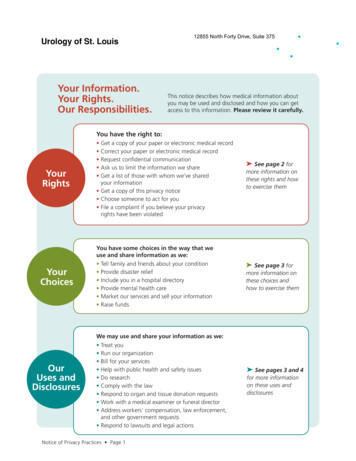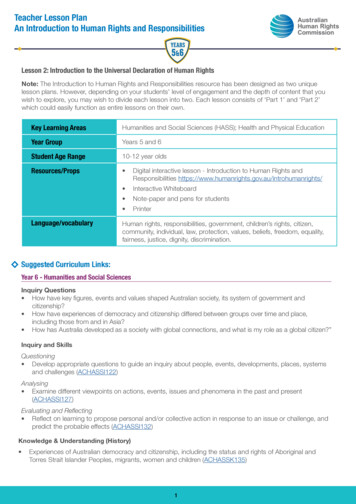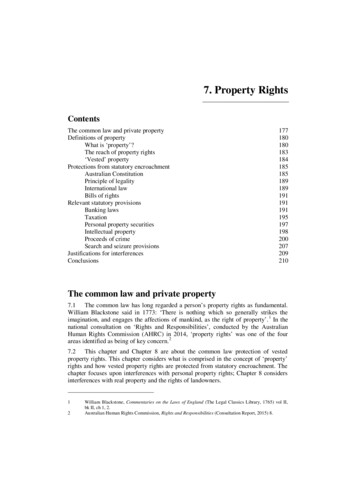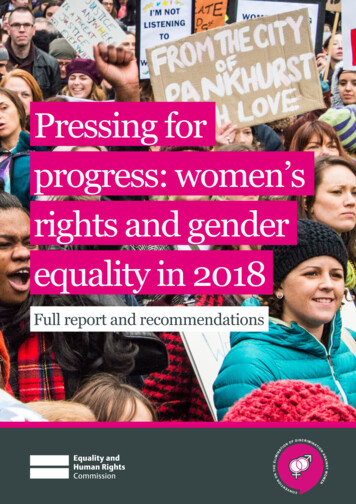
Transcription
Urology of St. LouisYour Information.Your Rights.Our Responsibilities.This notice describes how medical information aboutyou may be used and disclosed and how you can getaccess to this information. Please review it carefully.You have the right to:YourRightsYourChoicesOurUses andDisclosures Get a copy of your paper or electronic medical record Correct your paper or electronic medical record Request confidential communication Ask us to limit the information we share Get a list of those with whom we’ve sharedyour information Get a copy of this privacy notice Choose someone to act for you File a complaint if you believe your privacyrights have been violatedYou have some choices in the way that weuse and share information as we: Tell family and friends about your condition Provide disaster relief Include you in a hospital directory Provide mental health care Market our services and sell your information Raise fundsWe may use and share your information as we: Treat you Run our organization Bill for your services Help with public health and safety issues Do research Comply with the law Respond to organ and tissue donation requests Work with a medical examiner or funeral director Address workers’ compensation, law enforcement,and other government requests Respond to lawsuits and legal actionsNotice of Privacy Practices Page 1 See page 2 formore information onthese rights and howto exercise them See page 3 formore information onthese choices andhow to exercise them See pages 3 and 4for more informationon these uses anddisclosures
YourRightsWhen it comes to your health information, you have certain rights.This section explains your rights and some of our responsibilities to help you.Get an electronic orpaper copy of yourmedical record You can ask to see or get an electronic or paper copy of your medical record andother health information we have about you. Ask us how to do this.Ask us to correctyour medical record You can ask us to correct health information about you that you think is incorrector incomplete. Ask us how to do this. We will provide a copy or a summary of your health information, usually within 30days of your request. We may charge a reasonable, cost-based fee. We may say “no” to your request, but we’ll tell you why in writing within 60 days.Request confidentialcommunications You can ask us to contact you in a specific way (for example, home or office phone)or to send mail to a different address. We will say “yes” to all reasonable requests.Ask us to limit whatwe use or share You can ask us not to use or share certain health information for treatment,payment, or our operations. We are not required to agree to your request, and wemay say “no” if it would affect your care. If you pay for a service or health care item out-of-pocket in full, you can ask us not toshare that information for the purpose of payment or our operations with your healthinsurer. We will say “yes” unless a law requires us to share that information.Get a list of thosewith whom we’veshared information You can ask for a list (accounting) of the times we’ve shared your health informationfor six years prior to the date you ask, who we shared it with, and why.Get a copy of thisprivacy notice You can ask for a paper copy of this notice at any time, even if you have agreed toreceive the notice electronically. We will provide you with a paper copy promptly.Choose someoneto act for you If you have given someone medical power of attorney or if someone is your legalguardian, that person can exercise your rights and make choices about your healthinformation. We will include all the disclosures except for those about treatment, payment, andhealth care operations, and certain other disclosures (such as any you asked us tomake). We’ll provide one accounting a year for free but will charge a reasonable,cost-based fee if you ask for another one within 12 months. We will make sure the person has this authority and can act for you before we takeany action.File a complaint ifyou feel your rightsare violated You can complain if you feel we have violated your rights by contacting us using theinformation on page 1. You can file a complaint with the U.S. Department of Health and Human ServicesOffice for Civil Rights by sending a letter to 200 Independence Avenue, S.W.,Washington, D.C. 20201, calling 1-877-696-6775, or visiting www.hhs.gov/ocr/privacy/hipaa/complaints/. We will not retaliate against you for filing a complaint.Notice of Privacy Practices Page 2
YourChoicesFor certain health information, you can tell us your choices about whatwe share. If you have a clear preference for how we share your information in thesituations described below, talk to us. Tell us what you want us to do, and we will followyour instructions.In these cases, you haveboth the right and choiceto tell us to: Share information with your family, close friends, or others involved in your care Share information in a disaster relief situation Include your information in a hospital directoryIf you are not able to tell us your preference, for example if you are unconscious,we may go ahead and share your information if we believe it is in your best interest.We may also share your information when needed to lessen a serious and imminentthreat to health or safety.In these cases we nevershare your informationunless you give uswritten permission: Marketing purposesIn the case of fundraising: W e may contact you for fundraising efforts, but you can tell us not tocontact you again.OurUses andDisclosures Sale of your information Most sharing of psychotherapy notesHow do we typically use or share your health information?We typically use or share your health information in the following ways.Treat you We can use your health information andshare it with other professionals who aretreating you.Example: A doctor treating you for aninjury asks another doctor about youroverall health condition.Run ourorganization We can use and share your healthinformation to run our practice, improveyour care, and contact you when necessary.Example: We use health informationabout you to manage your treatment andservices.Bill for yourservices We can use and share your healthinformation to bill and get payment fromhealth plans or other entities.Example: We give information about youto your health insurance plan so it will payfor your services.continued on next pageNotice of Privacy Practices Page 3
How else can we use or share your health information? We are allowed or required to share yourinformation in other ways – usually in ways that contribute to the public good, such as public health and research.We have to meet many conditions in the law before we can share your information for these purposes. For moreinformation see: ers/index.html.Help with public healthand safety issues We can share health information about you for certain situations such as: Preventing disease Helping with product recalls Reporting adverse reactions to medications Reporting suspected abuse, neglect, or domestic violence Preventing or reducing a serious threat to anyone’s health or safetyDo research We can use or share your information for health research.Comply with the law We will share information about you if state or federal laws require it,including with the Department of Health and Human Services if it wants tosee that we’re complying with federal privacy law.Respond to organ andtissue donation requests We can share health information about you with organ procurementorganizations.Work with a medicalexaminer or funeral director We can share health information with a coroner, medical examiner, or funeraldirector when an individual dies.Address workers’compensation, lawenforcement, and othergovernment requests We can use or share health information about you: For workers’ compensation claims For law enforcement purposes or with a law enforcement official With health oversight agencies for activities authorized by law For special government functions such as military, national security, andpresidential protective servicesRespond to lawsuits andlegal actions We can share health information about you in response to a court oradministrative order, or in response to a subpoena.Instruction C: Insert any special notes that apply to your entity’s practices such as “we do not create ormanage a hospital directory” or “we do not create or maintain psychotherapy notes at this practice.”Instruction D: The Privacy Rule requires you to describe any state or other laws that require greater limits ondisclosures. For example, “We will never share any substance abuse treatment records without your writtenpermission.” Insert this type of information here. If no laws with greater limits apply to your entity, noinformation needs to be added.Instruction E: If your entity provides patients with access to their health information via the Blue Buttonprotocol, you may want to insert a reference to it here.To leave this section blank, add a word space to delete the instructions.Notice of Privacy Practices Page 4
Our Responsibilities We are required by law to maintain the privacy and security of your protected health information. We will let you know promptly if a breach occurs that may have compromised the privacy or securityof your information. We must follow the duties and privacy practices described in this notice and give you a copy of it. We will not use or share your information other than as described here unless you tell us we can inwriting. If you tell us we can, you may change your mind at any time. Let us know in writing if youchange your mind.For more information see: ers/noticepp.html.Changes to the Terms of this NoticeWe can change the terms of this notice, and the changes will apply to all information we have about you.The new notice will be available upon request, in our office, and on our web site.This Notice of Privacy Practices applies to the following organizations.Instruction G: If your entity is part of an OHCA (organized health care arrangement) that has agreed to ajoint notice, use this space to inform your patients of how you share information within the OHCA (such asfor treatment, payment, and operations related to the OHCA). Also, describe the other entities covered bythis notice and their service locations. For example, “This notice applies to Grace Community Hospitals andEmergency Services Incorporated which operate the emergency services within all Grace hospitals in thegreater Dayton area.”Notice of Privacy Practices Page 5
This section explains your rights and some of our responsibilities to help you.











